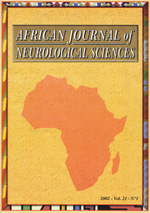
|
African Journal of Neurological Sciences
Pan African Association of Neurological Sciences
ISSN: 1015-8618
Vol. 21, No. 1, 2002, pp. 26-29
|
 Bioline Code: ns02005
Bioline Code: ns02005
Full paper language: French
Document type: Research Article
Document available free of charge
|
|
|
African Journal of Neurological Sciences, Vol. 21, No. 1, 2002, pp. 26-29
| en |
INITIAL EXPERIENCE WITH STEREOTACTIC SURGERY IN WEST AFRICA
N.A.B. ANDREWS
Abstract
BACKGROUND
The first stereotactic surgery program in West Africa was established in Ghana
in 1999.
OBJECTIVE
This study presents a retrospective evaluation of the pattern and outcome of the
first seventeen consecutive stereotactic procedures. It also discusses the benefits,
challenges and prospects of the program in West Africa.
METHODES
17 patients (11F, 6M) with CT disclosure of intracranial mass lesions that could
be assessed or managed stereotactically to the patients benefit (9,10). underwent
stereotactic procedures during a consecutive 18-month period. Analysis of charts,
relevant imaging studies and pathology reports were done.
RESULT
The average age of the patients was 37 years (range 2-72years). 71% had a preoperative
diagnosis of brain tumor; 83.3% were confirmed. All the procedures were performed
in the supratentorial compartment. A biopsy was done in every case. 35% underwent
biopsy and aspiration/evacuation. The mean CT scan time was 18 minutes (range
5-48minutes). The mean operating room time was 37 minutes (range 30-43minutes).
All the cases were done utilizing local anesthesia and intravenous sedation. The
average length of hospital stay was 2.7days (range 2-7 days). Histopathologic
results showed Arachnoid cyst (2), Neoplasms (10), infection (1), Intraaxial hematoma
(2), Thrombosis (1), Normal tissue (1). The failed biopsy rate was 6%. The surgical
objectives were achieved without complications. No blood transfusions were given
or required. Stereotactic procedures cost 50-59% less than conventional surgery.
CONCLUSION
It is concluded that the initial experience with stereotactic surgery in West
Africa consists of utilizing the Leksell Stereotactic System for the safe performance
of tumor biopsies and aspirations/evacuations with reduction in health care costs
compared to conventional surgery
Keywords
Neurosurgery, Stereotactic surgery, West Africa.
|
| |
| fr |
N.A.B. ANDREWS
Résumé
INTRODUCTION
Les premières interventions stérotaxiques ont été réalisées
en 1999 au GHANA.
OBJECTIF
Notre étude rétrospective évalue les caractènes cliniques,paracliniques
ainsi que le traitement et l'évolution de 17 patients ayant bénéficié
de ce type d'intervention
METHODES
L'étude de ces 17 patients opérés sur une péride de 18
mois a été faite à partir des dossiers d'hospitalisation.
Le cadre de Lecksell a été utilisé.
RESULTAT
La moyenne d'âge est de 37 ans (2-72 ans). La procédure a intéressé
uniquement l'étage sus - tentoriel et a concerné tous les patients.
La durée moyenne du CT-scan a été de 18 mn et celle des interventions
37 mn ( 30-43mn). La durée moyenne de séjour a été de 2,7
jours (2 - 7 jours). Les lésions suivantes ont été observées
: kystes arachnoïdiens (2), néoplasmes (10), infections (2), hématome
intra axial(2), thomboses(1), tissu normal (1). Le taux d'échec a été
de 6%. Aucune complication a été observé. Il n'y a eu aucune
transfusion. La technique stéotaxique coûte 50 à 59% moins cher
que la chirurgie conventionnelle.
CONCLUSION
Cette étude préliminaire conduite en Afrique de l'Ouest permet
de conclure à l'efficacité de la stéréotaxie quant au
diagnostic, à la sécurité et aux coûts par rapport à
la chirurgie conventionnelle.
Mots Clés
Afrique de l'Ouest - Neurochirurgie - Stéréotaxie
|
| |
© Copyright 2002 - African Journal of Neurological Sciences
Alternative site location: http://www.ajns.paans.org
|
|
